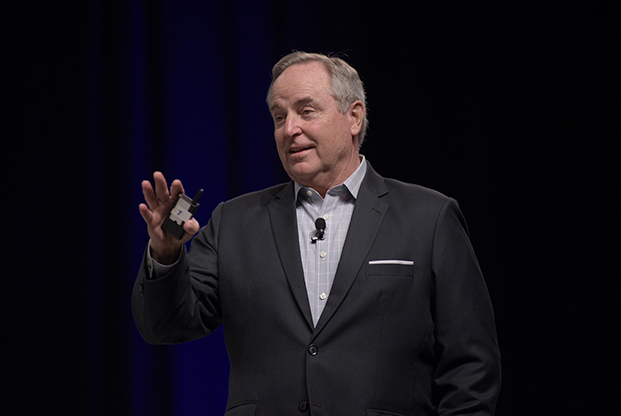
Gen. Mark Welsh speaks at AFA's 2019 Air Warfare Symposium on Feb. 28, 2019, in Orlando, Fla. Staff photo by Mike Tsukamoto.
You can’t escape change, former Air Force Chief of Staff retired Gen. Mark Welsh told a crowd of airmen and industry leaders at AFA’s 2019 Air Warfare Symposium last week.
Whether your unit is confronted with a training accident and its aftermath, or your company’s work within the defense industry gets one-upped by a competitor’s innovation, anyone’s world can be rocked “in a heartbeat,” he explained. Rather than letting disruption paralyze you, Welsh told the audience to choose to take charge of the things that can be controlled.
“The world is disruptive, so my view is get ready to lead in it,” he said.
Here are Welsh’s five keys to leading through chaos:
- Insist on common sense. According to Welsh, common sense should be “the first standard that you apply” to any situation. Whether you’re looking at rules, policies, or laws, if they don’t line up with common sense, they need to be tweaked. “Change the things that don’t make sense,” he said.
- Don’t look for stability. Create it. When you’re faced with a time marked by transition, it’s your job to create something that will stay consistent, Welsh said. “It can be anything. It can be your unit identity. It can be their faith in you and your leadership team. It can be your pride in the young people on the team, but something has got to be created, emphasized, reinforced constantly that your people know will be there tomorrow,” he explained.
- Have faith in your team. When faced with instability, Welsh said, people tend to put their faith in those they’re the closest with, with whom they have established relationships and whose track records of performance under pressure are proven. While this tends to make senior leaders—military and civilian, alike— the go-tos for problem solving, this attitude can also leave people in an organization’s more junior ranks feeling distrusted. “Those young folks in our organizations, … bring new ideas, new perspectives, new potential solutions, new skills,” Welsh said. “Sometimes they are the solution to the problem you’re looking at. Believe in ‘em. Maybe even more importantly, give ‘em a voice.”
- Keep your organization’s pride alive. Figure out what your team members are most proud of “and just stoke the flame.” “Pride is one of the strongest types of connective tissue,” he said. “It connects people to people, people to organizations, people to ideas, people to courage.” Welsh said that protecting and reinvigorating pride will bring stability to an organization and help you work through the disruption.
- Care so much that it hurts. “The tougher it gets, the more unstable it gets, the more uncertainty there is around your people, the more they need you to care,” Welsh said. “It’s what you signed up for when you said you wanted to lead.” That care must extend to every facet of your team members’ work, personal lives, and livelihoods—“everything related to them” has to be your priority. And that level of concern needs to grow in proportion to the amount of instability you and your team face. “If it hurts, you’re doing it right,” he said.
